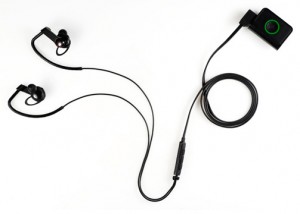 LG's heart rate sensing earphones use technology licensed from Valencell.
LG's heart rate sensing earphones use technology licensed from Valencell.
Valencell, a Raleigh, North Carolina-based company that powers health and medical sensors in some wearable devices, most notably in sensor-equipped headphones, has raised $7 million in its third round of funding. The new round brings the company's total funding to $13 million, excluding an additional $3 million in grants.
The round was lead by new investor WSJ Joshua Fund, a recently founded Texas-based investor group. Existing investors TDF Ventures, True Ventures and Best Buy Capital also contributed. Valencell also announced the hiring of a new CEO, Michael Dering, who most recently served as CEO of service management company ServiceBench.
Valencell has been around since 2006. The company's last funding round was a $5.5 million investment led by Best Buy Capital in 2011. Since then, Valencell has been working on getting major licensing partners for its headset-based heart rate and activity sensor technology, called PerformTek. The last two CES shows have seen the introduction of heart rate sensing earbuds powered by PerformTek: the iRiver On headset in 2013 and LG's Heart Rate Earphones in 2014, which are designed to work in tandem with LG's LifeBand activity tracker.
PerformTek can also power heart rate tracking outside of earphones: the company also has embedded technology in two armband trackers from Scosche: the Rhythm + and Rhythm Smart. The company spent the many years between its launch and the launch of its first products building up an impressive IP portfolio: Valencell holds 14 patents on PerformTek with more pending. The company claims that tracking at the ear is more accurate than the wrist or arm, especially when the wearer is moving around a lot.
Valencell says it will use the investment to "support the increasing market demand, further technological development, sales and marketing of its PerformTek-powered biometric sensors."
“In the past 12 months, there has been a true explosion in ‘wearable technology’, as the size, cost and convenience of the technology has aligned,” Dering said in a statement. “Valencell is focused on providing those attributes in combination with the most accurate continuous heart rate and performance technology on the market. Ultimately, accuracy and ease of use will be the factors that consumers will look for in the products they choose to use.”
If, as many are predicting, the smartphone itself really does beat out wearables as the default device for fitness tracking, technology like Valencell's could prove to be popular way to integrate heart rate tracking and more accurate activity tracking into that process.
“People everywhere are listening to music while running and exercising,” Valencell cofounder Dr. Steven LeBoeuf said in a statement back in 2011. “Integrating heart rate sensors directly and seamlessly into music earbuds fits right into the behavior of consumers today. Everyone’s body responds differently to exercise, so being able to monitor the heart, the body’s engine, will help consumers customize and personalize workout regiments for their specific goals whether it’s for weight loss, toning or endurance. Users will be able to view their metrics live through fitness applications on their iPhone, Android phones, other mobile devices and online.”
















